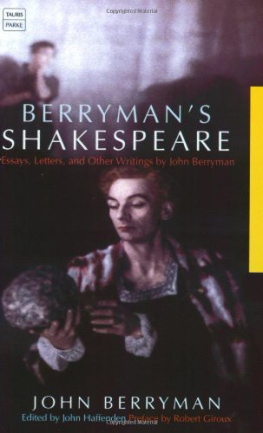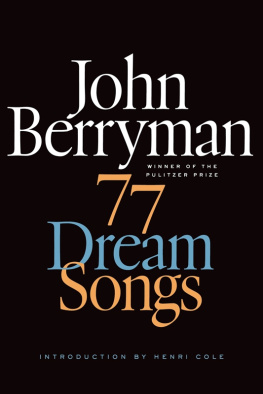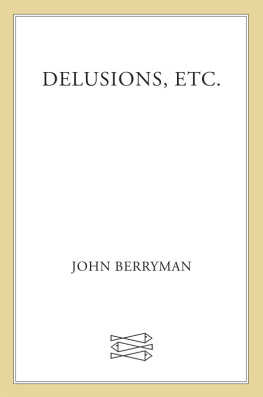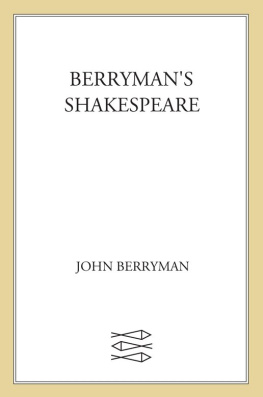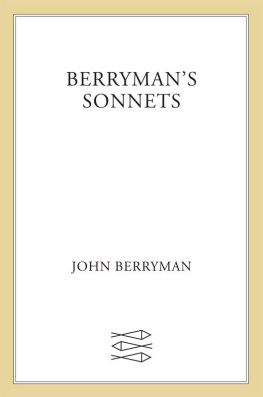John Berryman - John Berryman
Here you can read online John Berryman - John Berryman full text of the book (entire story) in english for free. Download pdf and epub, get meaning, cover and reviews about this ebook. publisher: Farrar, Straus and Giroux, genre: Non-fiction. Description of the work, (preface) as well as reviews are available. Best literature library LitArk.com created for fans of good reading and offers a wide selection of genres:
Romance novel
Science fiction
Adventure
Detective
Science
History
Home and family
Prose
Art
Politics
Computer
Non-fiction
Religion
Business
Children
Humor
Choose a favorite category and find really read worthwhile books. Enjoy immersion in the world of imagination, feel the emotions of the characters or learn something new for yourself, make an fascinating discovery.

- Book:John Berryman
- Author:
- Publisher:Farrar, Straus and Giroux
- Genre:
- Rating:5 / 5
- Favourites:Add to favourites
- Your mark:
- 100
- 1
- 2
- 3
- 4
- 5
John Berryman: summary, description and annotation
We offer to read an annotation, description, summary or preface (depends on what the author of the book "John Berryman" wrote himself). If you haven't found the necessary information about the book — write in the comments, we will try to find it.
This volume brings together all of Berrymans poetry, except for his epic The Dream Songs, ranging from his earliest unpublished poem (1934) to those written in the last months of his life (1972). A definitive edition of one of Americas most distinguishe
John Berryman — read online for free the complete book (whole text) full work
Below is the text of the book, divided by pages. System saving the place of the last page read, allows you to conveniently read the book "John Berryman" online for free, without having to search again every time where you left off. Put a bookmark, and you can go to the page where you finished reading at any time.
Font size:
Interval:
Bookmark:
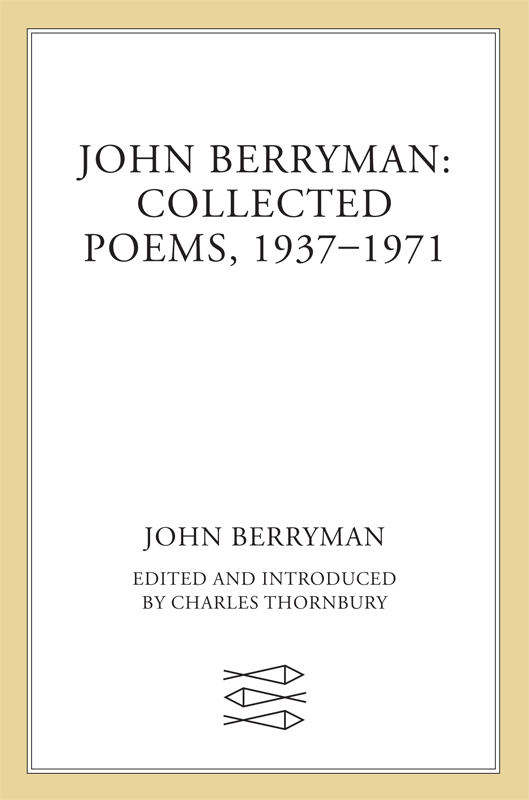
 The author and publisher have provided this e-book to you for your personal use only. You may not make this e-book publicly available in any way. Copyright infringement is against the law. If you believe the copy of this e-book you are reading infringes on the authors copyright, please notify the publisher at: us.macmillanusa.com/piracy. Contents Editors Note Collected Poems 19371971 brings together for the first time John Berrymans seven collections of short poems. This new edition incorporates only the collections he published and includes as well Homage to Mistress Bradstreet, one of his two long poems.
The author and publisher have provided this e-book to you for your personal use only. You may not make this e-book publicly available in any way. Copyright infringement is against the law. If you believe the copy of this e-book you are reading infringes on the authors copyright, please notify the publisher at: us.macmillanusa.com/piracy. Contents Editors Note Collected Poems 19371971 brings together for the first time John Berrymans seven collections of short poems. This new edition incorporates only the collections he published and includes as well Homage to Mistress Bradstreet, one of his two long poems. The inclusive dates, 1937 to 1971, correspond to the dates of composition of the earliest and latest poems rather than the dates of the publication of his collections. Henrys Fate and Other Poems (1976) is not collected here because Berryman himself did not select and arrange the volume; The Dream Songs (1969), a self-contained major work, will continue to be published as a separate volume. As editor of Collected Poems 19371971, my job was determined by the kind of edition the publisher requestedone that was general rather than exclusively scholarly. The complete history of the changes and transmissions of each collection and poem, for example, was not to be documented. Nevertheless, since my duty was to present an accurate textbelieving the general reader is as interested in having an accurate text as the scholarly oneit was agreed that I would document all instances where I chose a reading different from that of the published first or revised edition of each collection. The Editors Notes, Guidelines, and Procedures, and the Copy-Texts and Variants trace the historical embodiments of Berrymans published texts and describe the nature of the textual problems his manuscripts, corrected galleys, and page proofs present.
The Copy-Texts and Variants notes, less interpretive than factual, show how the texts for Collected Poems were established. My Introduction is addressed to both new and experienced readers of Berrymans poetry. It is arranged in nine parts: the first five present an overview of major themes in Berrymans life and work; the last four inquire into his poetics. Abbreviations WORKS BY BERRYMAN
| 20P | Twenty Poems in Five Young American Poets |
| Poems | Poems |
| TD | The Dispossessed |
| Sonnets | Sonnets to Chris |
| Homage | Homage to Mistress Bradstreet |
| HomageAOP | Homage to Mistress Bradstreet and Other Poems |
| Thoughts | His Thought Made Pockets & the Plane Buckt |
| L&F | Love & Fame |
| De | Delusions etc of John Berryman |
| CP | Collected Poems 19371971 |
| FF | Faber and Faber, Ltd. (London, England) |
| FSG | Farrar, Straus and Giroux (New York City) |
| JBP | John Berryman Papers, University of Minnesota Libraries |
| CTS | Carbon typescript |
| HW | Handwritten |
| MS | Manuscript |
| TS | Ribbon typescript |
Eleven years later, she was no less baffled by Berrymans Sonnets when she wrote to Lowell: I have been struggling with those sonnetsmany beautiful lines but I do find him difficult. Her bafflement, nevertheless, did not diminish her sense of the penetrating power of Berrymans poetry: One has the feeling a 100 years from now, she wrote to Lowell in 1962, that he may be all the rageor a discoveryhasnt one? Three months after Berrymans death, in January 1972, Lowell recalled his moments of uncertainty in hearing Berrymans voice: He never stopped fighting and moving all his life; at first, expert and derivative, later full of output, more juice, more strange words on the page, more obscurity. Im afraid I mistook it for forcing, when he came into his own. No voice now or persona sticks in my ear as his. It is poignant, abrasive, anguished, humorous. Other readers heard Berrymans voice and reached different conclusions.
As early as 1948, Berrymans poetry seemed surcharged to one reviewer of The Dispossessed. [A] fanfare of shipwrecked syntax, textbook inversions and alliterations. But another reviewer, in The Times Literary Supplement, admired his style as a living compromise between the way people speak and the outsize gestures that poetry traditionally demands. While Berryman bristled at unfavorable reviews, he was pleased to stir up controversyLong may they rave, he would sayfor opposing views attest to what his poetry asks. He prods us to re-examine our fundamental notions about the design and function of poetry, what poetry does for, even to, the poet and the reader. The critical standards by which Berryman measured other poets suggest an insight into his notions about his own poetry.
Generally speaking, especially during the period of his most accelerated development in the mid- to late 1940s, he might have been writing about himself in praising other poets intensity and urgency and power. He admired Stephen Cranes primitive style and the power of his refusal to guarantee the readers expectations. He was attracted to Edmund Wallers violations of the readers expectations: Waller so controlled the forms in his best poems as to produce an expectation differing wholly from previous expectations, and then by violating the expectation got his effects. He found a kinsman in Tristan Corbires abrupt phrasing, violent shifts, and lightning alternations of the sardonic and the profound. Enlarging the tactic of stylistic violations of expectation to the design of a whole poem, Berryman regarded the first two lines in The Love Song of J. Alfred Prufrock as being diminished or destroyed in the rest of the poem.
Several of Berrymans early poems signaled the unexpected turns of Homage to Mistress Bradstreet and The Dream Songs. He described his poem Winter Landscape, written in early 1939, as pivoting on a missing or misrepresented element in an agreed-on or imposed design. By 1955, after having completed Homage, he could articulate his fundamental poetics: The two great things [in all writing], he wrote to his mother, are to be clear and short; but rhythms matter too, and unexpectedness. You lead the reader briskly in one direction, then you spin him round, or you sing him a lullaby and then hit him on the head. Berrymans twin standards would appear to be at odds with unexpectedness, but to be short may mean that the poem will lurch abruptly, accelerate, and leave the reader standing still. Similarly, to be clear may mean that the design and language of a poem take into account, perhaps enact, the unexpected turns of human experience.
The poem, it follows, is open to the crosscurrents of the drift-of-life, an openness that gives a sense of being simultaneously polished and jagged, appealing and offensive. In the gaps and silences of lightning shifts, readers may feel as though they have been hit on the head. Berryman also had his eye on the reader in choosing his (outwardly) defiant tactic: [C]ontrol the reader, Berryman advises a young writer, to do half the work (Purgatory, L&F ). Readers are controlled to the extent that they are required to stake a claim in the creation of understanding and meaning. If readers are given the language, characters, and meaning they expect or want to hear, their feelings are unarticulated and their minds unexamined. They may follow nervously; indeed, Berryman believed that the most successful poem rattles the readers expectations.
Font size:
Interval:
Bookmark:
Similar books «John Berryman»
Look at similar books to John Berryman. We have selected literature similar in name and meaning in the hope of providing readers with more options to find new, interesting, not yet read works.
Discussion, reviews of the book John Berryman and just readers' own opinions. Leave your comments, write what you think about the work, its meaning or the main characters. Specify what exactly you liked and what you didn't like, and why you think so.

